#John1v1
Text
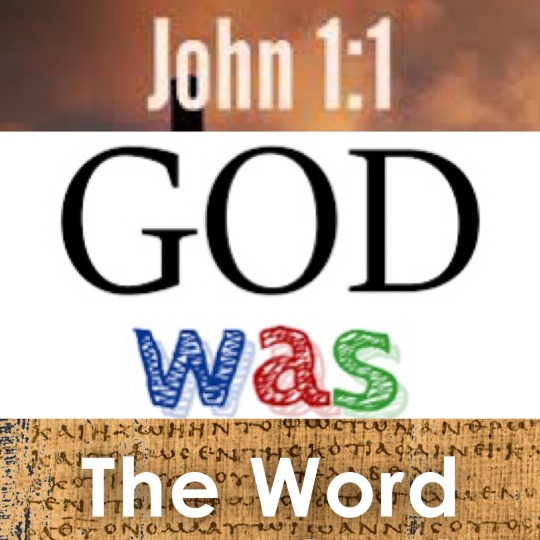
How Should We Translate John 1.1: “the Word was God,” or “God was the Word”❓
By (native Greek speaker) Eli Kittim 🎓
John 1.1:
Ἐν ἀρχῇ ἦν ὁ λόγος, καὶ ὁ λόγος ἦν πρὸς
τὸν θεόν, καὶ θεὸς ἦν ὁ λόγος.
John 1.1 is often broken down into 3 phrases:
Phrase 1: Ἐν ἀρχῇ ἦν ὁ λόγος
Phrase 2: καὶ ὁ λόγος ἦν πρὸς τὸν θεόν
Phrase 3: καὶ θεὸς ἦν ὁ λόγος.
From the outset, before they even consider the process of biblical interpretation and exegesis, textual critics and Greek scholars set out to produce a faithful *translation* of the original Greek New Testament. Bear in mind that the processes of translation and interpretation are not the same. We expect the translation committees to translate (not to interpret) the text!
Therefore, a literal and accurate translation of the Greek language should correctly translate the last phrase of Jn 1.1 as “God was the word.” In other words, the third phrase of Jn 1.1 (καὶ θεὸς ἦν ὁ λόγος) should be translated exactly as it was written in the original Greek (for emphasis), not rearranged and reassembled (in the target language) as we would wish it would be. In the original Greek, the text doesn’t actually say that “the Word was God,” as most modern translations maintain:
That’s an interpretation❗️
Rather, the original Greek New Testament says that “God was the Word”! So, the *interpretative* rearrangement is forcing the critical reader to read it backwards, which neglects the emphasis of the word order in the original Greek. It’s as if we were told to read Hebrew backwards, from left to right. What is more, the third phrase of John 1.1 doesn’t actually say ὁ λόγος ἦν (the word was). It says θεὸς ἦν (God was). If the text wanted to emphasize that “the word was God,” the phrase would have been: καὶ ὁ λόγος ἦν θεὸς. It would have been written as follows:
Ἐν ἀρχῇ ἦν ὁ λόγος, καὶ ὁ λόγος ἦν πρὸς
τὸν θεόν, καὶ ὁ λόγος ἦν θεὸς.
But that’s not what it says! To try to manipulate what the original Greek New Testament is actually emphasizing——by rearranging or *reinterpreting* it during the translation process——is equivalent to editing and, therefore, corrupting the “inspired” text.
Admittedly, the third phrase of Jn 1.1 is somewhat of a Gestalt configuration in which different *meanings* can arise depending on the angle from which it is viewed. One could make the *interpretative* argument that the original phrase “God was the Word” might be equivalent to or interchangeable with “the Word was God.” In other words, on an *exegetical* level, one could make the case that the phrase “the Word was God” might be the converse of “God was the Word.” I don’t deny that possibility on grammatical grounds. That is certainly worthy of exegetical consideration. But when we’re initially *translating* the text, we shouldn’t be interested in theories of exegesis. Rather, we should be entirely focused on producing a faithful translation, which precedes interpretation and subsequent theological ramifications.
In *interpreting* the third phrase of Jn 1.1, many textual scholars typically reverse the word-order of the original Greek phrase (via a grammatical rule) so that we’re forced to read the words backwards. According to this rule, we can determine the *subject* of a phrase if a noun falls into one of the following categories: a) if it’s a proper name; b) if it’s preceded by an article; or c) if it’s a personal pronoun. However, in contradistinction to this grammatical rule, θεὸς can actually be the subject that precedes the verb ἦν (here, a form of "to be"), while λόγος can be the predicate nominative. On the other hand, in order to identify θεὸς as the predicate nominative and λόγος as the subject, one has to invoke what is known as the “Subset Proposition" rule, or the "Convertible Proposition" rule. In other words, this alteration involves a complex set of esoteric grammatical assumptions and decisions which essentially turn the text upside down.
By contrast, the straightforward way of reading the text seems to be the smoothest and the most natural. Not to mention that the phrase “God was the Word” is actually a faithful translation, whereas the phrase “the Word was God” is merely an *interpretation.* I’m not arguing that the phrase “the Word was God” is a wrong interpretation. I’m arguing that it’s a wrong translation! In the critical edition, we must always let the reader know what the text ACTUALLY says, not our INTERPRETATION of what we think it might mean. That can go in the commentary section. In translating a text——if the word-order of the original Greek doesn’t make any sense——translators are allowed to rearrange the words in order for it to make sense. But this exception to the rule doesn’t apply here because the original Greek makes perfect sense! Therefore, our decision to abandon our fidelity to the lexical details and grammatical structures of the Greek New Testament makes us no better than the scribes who corrupted it.
Moreover, the decision to change the *meaning* of the text (or to *reinterpret* it) is done for obvious theological reasons. Christian translators have a theological axe to grind. In order to validate and uphold the Trinity, they want to maintain the *distinction* between God the Father (the first person of the Trinity) and the Word of God (the second person of the Trinity). Hence why they deliberately *translate* the last part of Jn 1.1 backwards. Because if they were to translate it as the author intended it, namely, that “God was the word,” it might give the wrong impression that there’s no distinction between the Father and the Word. However, the third phrase of Jn 1.1 is not necessarily making a *modalistic* theological claim that there’s no distinction between the Father and the Word. Rather, since the second phrase (καὶ ὁ λόγος ἦν πρὸς τὸν θεόν) clearly distinguished the two persons of the Trinity, the third phrase establishes their *ontological* unity by affirming that God was not simply separate from the Word, but that God himself was, in fact, the Word per se! After all, the first and second persons of the Trinity share one homoousion (essence): “I and the Father are one” (Jn 10.30)!
At any rate, this *interpretation* has become so wide spread, to such an extent that it has become a dogmatic and systematic standard, not only overriding or supplanting the original *translation* but also prompting modern translations to follow suit. It’s a case of special pleading where an *interpretation* has supplanted a *translation*!
However, there are many credible Bible translations that *translate* the last phrase of Jn 1.1 as “God was the Word”:
Coverdale Bible of 1535
In the begynnynge was the worde, and the
worde was with God, and God was ye
worde.
Smith's Literal Translation
In the beginning was the Word, and the
Word was with God, and God was the Word.
Literal Emphasis Translation
In the beginning was the Word, and the
Word was with God, and God was the Word.
Catholic Public Domain Version
In the beginning was the Word, and the
Word was with God, and God was the Word.
Lamsa Bible
THE Word was in the beginning, and that
very Word was with God, and God was that
Word.
Aramaic New Covenant: In the beginning
the Word having been and the Word having
been unto God and God having been the
Word.
Concordant Literal New Testament: In the
beginning was the word, and the word was
toward God, and God was the word.
Coptic Version of the New Testament: In
(the) beginning was the Word, and the Word
was with God, and God was the Word.
Great Bible (Cranmer 1539): In the
begynnynge was the worde, and the worde
was wyth God: and God was the worde.
New English Bible: When all things began,
the Word already was. The Word dwelt with
God, and what God was, the Word was.
Revised English Bible: In the beginning the
Word already was. The Word was in God’s
presence, and what God was, the Word
was.
Today’s English New Testament: In the
beginning was the Logos. And the Logos
was with God. And God was the Logos.
The Wyclif Translation (by John Wycliffe): In
the bigynnynge was the word and the word
was at god, and god was the word.
Latin Vulgate: in principio erat Verbum et
Verbum erat apud Deum et Deus erat
Verbum.
Vulgate translation: in the beginning was
the Word and the Word was with God and
God was the Word.
See also:
Was the Word “God” or “a god” in John 1.1❓
#greektranslations#Greek linguistics#GreekPhilology#Βιβλικήμελέτη#John1v1#theWordwasGod#GodwastheWord#θεὸςἦνὁλόγος#biblicalinterpretation#ελικιτίμ#ModalisticMonarchianism#trinity#biblicalgreekgrammar#koine greek#το_μικρο_βιβλίο_της_αποκάλυψης#εκ#GreekNewTestament#ek#Bibletranslations#Bibleversions#the little book of revelation#elikittim#homoousion#john10v30#biblestudy#authorialintention#biblicalexegesis#ontologicalunity#textual criticism#theologicalbias
4 notes
·
View notes
Text
Daily Bible Reading 01 October 2023
Daily Bible Reading: Luke 1, John 1:1-14
Book: Luke
Author: Not stated but traditionally attributed to Luke, a Gentile physician (Colossians 4:14) and a missionary companion of the Apostle Paul (2 Timothy 4:11).
Date written: Possible the AD70s-80s, as the gospel was spreading throughout the Roman Empire.
In ten words or less: Jesus is the Savior of all people, whether Jew or Gentile.
“From Know…
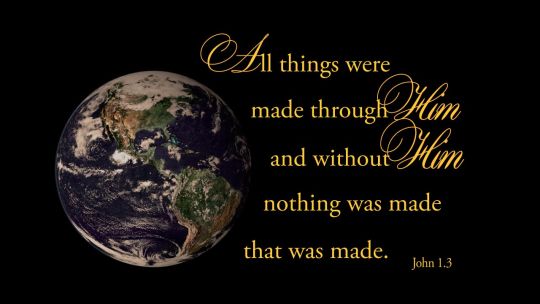
View On WordPress
0 notes
Text
The Eternal Word: John 1:1
📖 "In the beginning was the Word, and the Word was with God, and the Word was God." - John 1:1 (NKJV) 🕊️
This powerful verse from the Gospel of John reminds us of the eternal nature of Christ, often referred to as the "Word." It beautifully illustrates that Jesus existed from the very beginning and was both with God and God Himself. His divine presence in our lives brings light, truth, and hope.
As we navigate life's journey, let's take comfort in the fact that God's Word is a guiding light. It teaches us about God's character, His love for us, and His plan of salvation. May we find inspiration and strength in these words, trusting in the Word that became flesh to show us the way.
#John1v1 #WordOfGod #NKJV #InspirationalVerse
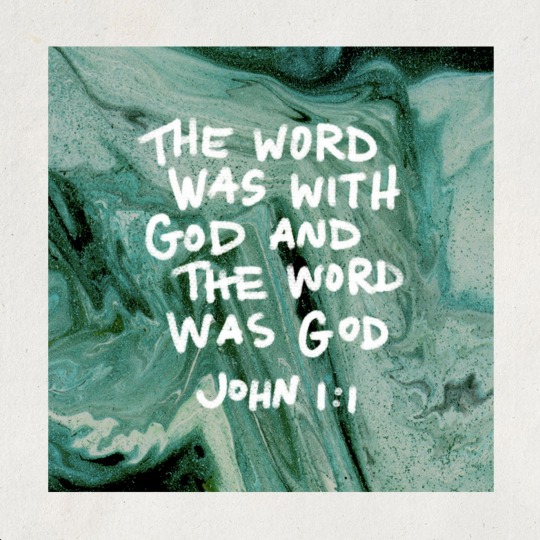
View On WordPress
#Assurance#Devotionals#Faith#Grace#Guidance#Hope#Inspiration#John 1:1#Prayer#Reflection#Reflections#Revelation#Salvation#Spiritual#Transformation
0 notes
Photo

Eternal Father!!! #EternalFather #Yhuh #Scripture📜 #John #John1 #John1v1 https://www.instagram.com/p/CSCt83NF66w/?utm_medium=tumblr
0 notes
Photo

Morning Devotional #alllivesmatter #livingforGod #godsplan #bibleverse #john1v1-5 https://www.instagram.com/p/CA9-vhmDtFF/?igshid=rgg6igr2pbp2
0 notes
Photo

[07.24.19] #john1v1 #inthebeginning #theword #letuspray #dailyverse 🙏 #val31213 🦋 #valsfiles205 https://www.instagram.com/p/B0jIVqZncpf/?igshid=nivfhum8m11a
0 notes
Photo
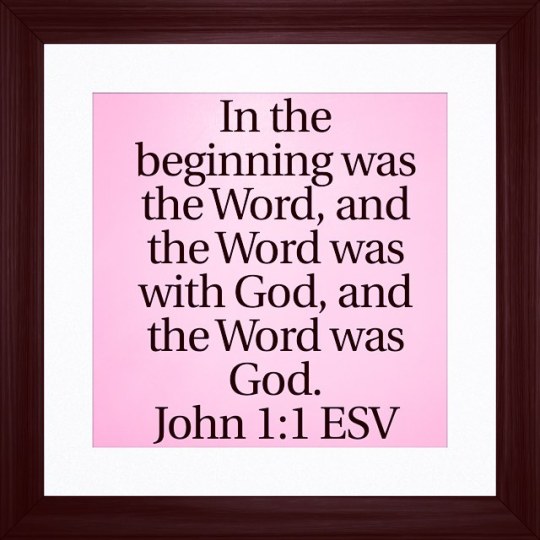
#verseoftheday #blessedthursday @youversion #john1v1 (at Stone Haven Community)
0 notes
Photo
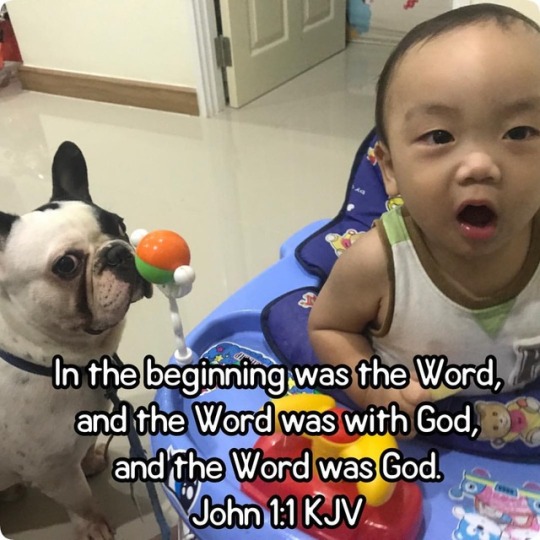
“ในปฐมกาลพระวาทะดำรงอยู่ และพระวาทะทรงสถิตอยู่กับพระเจ้า และพระวาทะทรงเป็นพระเจ้า” ยอห์น 1:1 TH1971 #ขอบคุณพระเจ้า 😇#ThankGod #Jesus #john1v1 #wordsofgod #wordsofwisdom #music #archie
0 notes
Video
youtube
John 1v1-18:- Word is with God and God is Word. Anyone who delivers His ... John 1v1-18:- Word is with God and God is Word. Anyone who delivers His Word in the very son of God Elohim, Allah, Parbrahm, etc.GOSPEL IS CALLED “LOGO”
AND LOGO IS THE EXTRACT/NECTAR OF “LOGICAL REASONING” – SATGUR PARSAD.Once-born people are incapable of logical reasoning and, therefore, the logo is for the twice-born people of discerning intellect called the “holy spirit”, surtti or “common sense”.
So, if you want Gospel, then you must think logically over your own heart. Thus, listen to everyone and ponder over it logically in your own heart. Then, Gospel would be written over the living tablets of heart – 2corn 3.Scriptures, the dead letters are “deadly poison” to Gospel.Scriptures, the “dead letters” that the once-born people are taught in the universities and colleges, they are “old wines” or “milk for the babies”. This is the Jewish leaven which Jesus forbade.
The twice-born people of “discerning intellect” are like the “birds of the air” capable of “logical reasoning” to brew the “New Wine” within their own hearts. For this, you need to be “impartial and unbiased” like the little children.
Thus, you do not need to go to a university to know Gospel but a heart burning for “Gospel Treasures”.
University degrees in “dead letters” will turn you into a super donkey carrying “Holy Books”. “Letter killeth, spirit giveth Life”.
Typical Youtube Video on Son of God:-
Son represents Father, so in Jesus, we are the sons of Elohim and we should display His qualities for Salvation.
https://youtu.be/dQ8pSqeFjQw
Natural bastards versus supernatural Bastards.Holy Gospel of our Supernatural Father Elohim, Allah, Parbrahm, etc. delivered by the First anointed Christ, which in Punjabi we call “Satguru” Jesus according to Saint John 1,1-18.
In the beginning was the Word, and the Word was with God, and the Word was God. As son represents Father, so Christ represents our Supernatural Father Elohim, Allah, Parbrahm, etc. He, the Christ within the heart of Jesus was in the beginning with God. All things came to be living through him, our supernatural Father of our supernatural self “soul” and without him nothing came to be living. What came to be through him was life, and this life was the light of the human race; the light, His Word = Oral Torah derived through logical reasoning called “Logo”, shines in the darkness, and the darkness has not overcome or suppress it. A man named John was sent from God. He came for testimony, to testify to the light, so that all might believe through him. John, the Baptist was Prophet Elijah (my god is Yahweh, the heavenly father of Jesus). He was not the light but moon, but he came to testify to the light. That is Christ is the Primary Source of Light, Sun and John, the Baptist was the Moon. If we consider the Tree of life in which the part of the tree that we can “see” with our two natural eyes that one can read the dead letters or Scriptures = Moon whilst the Roots of the Tree that we “perceive” and it is of living God Elohim, Allah, Parbrahm, etc. That is, NOOR, LIGHT, IS OF ALLAH, PARBRAHM, ELOHIM, ETC. WHILST THE REFELCTIONS, NATURE, ARE OF YAHWEH, BRAHMA, KHUDA, ETC. The true light, the Gospel Truth = Oral Torah, which enlightens everyone, was coming into the world. He, the Christ, was in the world, and the world came to be through him or He was the Lord of Sabbath, but the world did not know him unless by the grace of our Supernatural Father or the people pre-destined of our Father. He came to what was his own of the Judah tribe in the line of King David as the Royal King, but his own people knew that He was the Christ but they not only didn’t accept him but they killed him mercilessly. But to those who did accept him he gave power to become children of our Supernatural Father God, to those who believe in his name and ate His Flesh and drank the Blood of Christ, who were born not by natural generation as the once-born are nor by human choice nor by a man's decision but by the very grace of our Supernatural Father God to become the sons of Most High Elohim, Allah, Parbrahm, etc. And the Word = Christ became flesh = Yahshua and made his dwelling among us, and we saw his glory, the glory as of the Supernatural Father's Anointed, and not only Son, full of grace of our Father and Gospel Truth. John, the Moon, an Ideal Rabbi – Matt 13v52 or Prophet Elijah, who worshipped demiurge god Yahweh, Brahma, Khudah, etc., the Potters of our physical bodies or Nature at large testified to him and cried out, saying, "This was he of whom I said, 'The one who is coming after me, the Moon, ranks ahead of me, the “Sun”, because he existed = Word before me.'" From his fullness or “induction” we have all received, grace by longing His Word in place of grace to be the Virgin Brides of Christ Jesus, because while the law was given through Moses,..........................For the full description, please visit my website:-
www.gnosticgospel.co.uk/John1v1-18.htm
0 notes
Video
First try lol #john1v1 #tetelestaiboards
0 notes
Text
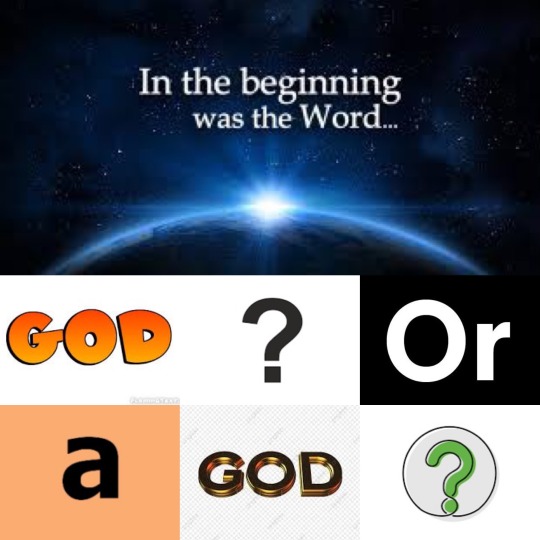
Was the Word “God” or “a god” in John 1.1❓
By Bible Researcher Eli Kittim 🎓
John 1.1 (SBLGNT):
Ἐν ἀρχῇ ἦν ὁ λόγος, καὶ ὁ λόγος ἦν πρὸς
τὸν θεόν, καὶ θεὸς ἦν ὁ λόγος.
John 1.1, which is a throwback to Genesis 1.1, aims to define the primordial relationship of “the Word” (i.e. Christ) to God. But certain skeptics have challenged the idea that the fullness of the godhead was in Christ (Col. 2.9), who is said to be “the Word” (i.e. ὁ λόγος). Specifically, Jehovah's Witnesses have raised the argument of “a god” in John 1.1, implying that Christ is a lesser and inferior god that was created. Let’s explore that assertion. John 1.1 is traditionally broken up into three phrases that are separated by commas:
1st phrase: Ἐν ἀρχῇ ἦν ὁ λόγος,
2nd phrase: καὶ ὁ λόγος ἦν πρὸς
τὸν θεόν,
3rd phrase: καὶ θεὸς ἦν ὁ λόγος.
First, to suppose that John is talking about many gods, or more than one god, is a theological speculation and a grammatical imposition that is going beyond what is written in the text or what we know about the theology of the Gospel of John.
Second, John *did* mention the definite article τόν in the second phrase, and so he is not obligated to repeat it in the third phrase, as that would be redundant and tautological.
Third, another reason why the third phrase of John 1.1 doesn’t require the definite article (before the term θεός) is because it was already *used* in the second phrase, and therefore it necessarily *carries over.* For example, if I were to write, “I have a pretty good temper, and a very amiable disposition,” I would not be required to repeat the first part of the phrase. In other words, I wouldn’t be required grammatically to write “I have a pretty good temper, and [I have] a very amiable disposition.” The “I have” is *carried over* and doesn’t need to be repeated. It would be considered redundant. Similarly, in addressing τόν Θεόν with a definite article in the second phrase, John doesn’t have to repeat τόν Θεόν in the third phrase, since it is *carried over.* Here’s another example. I could write “God is one being, not two beings.” But that’s redundant. Now, if I were to rewrite the same sentence correctly and say “God is one being, not two,” would anyone argue that the term “two” may not necessarily refer to the concept of being because the word “being” is not mentioned? That’s the same kind of argument that skeptics are raising here in John 1.1.
Since John has already established (as a monotheist) that he’s talking about one (and-only-one) particular God (namely, τόν Θεόν) in the second phrase, then this syntactical construction must necessarily *carry over* into the third phrase. In other words, the term Θεός in the third phrase grammatically refers back to “the God” (τόν Θεόν) mentioned in the second phrase. Therefore, when John writes——… τὸν θεόν (second phrase), καὶ θεὸς ἦν ὁ λόγος (third phrase)——the “God” of the third phrase is a direct reference to “the God” of the second phrase. It’s obviously the same “God” in both phrases, not a different one. And given that God is one being, not two, which other god could John be possibly referring to❓
In Greek, the third phrase in John 1.1 is actually read in two different ways, not only as “the Word was God,” but also as “God was the Word.” In the third phrase, there’s no ontological distinction between God and the Word——after all, they share one being: “I and the Father are one” (Jn 10.30)——because John already made the distinction (of persons) in the second phrase.
Thus, the “a god” argument of the Jehovah’s Witnesses——which is raised in “The New World Translation of the Holy Scriptures (NWT)——is totally bogus and unwarranted both grammatically and theologically❗️
#John1v1#λόγος#godhead#theWord#thelittlebookofrevelation#deity#gospel of john#θεὸς#Philippians2v6#SBLGNT#elikittim#GreekNewTestament#biblicalexegesis#biblestudy#εκ#ελικιτίμ#NWT#Hebrews1v3#historical_grammatical_method#John10v30#Colossians2v9#TheNewWorldTranslationoftheHolyScriptures#το μικρό βιβλίο της αποκάλυψης#theGod#biblicalapologetics#agod#christian theology#jehovahswitnesses#God#ek
6 notes
·
View notes